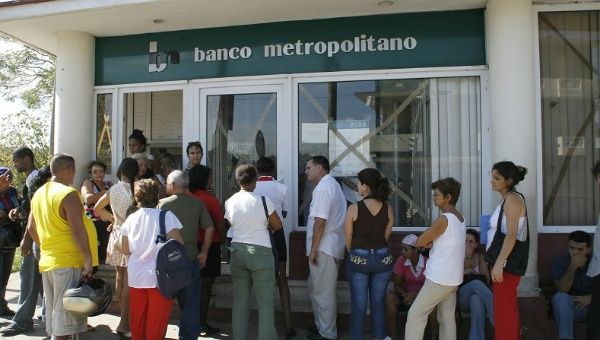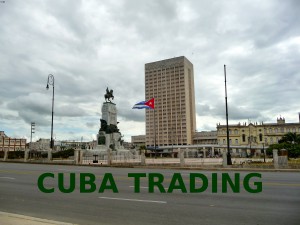AT&T and ETECSA Agree Direct Interconnection Between Cuba and US
 AT&T has reached agreements for Cuba roaming and direct interconnection with Empresa De Telecomunicaciones De Cuba (ETECSA). The deal continues to enhance AT&T’s global coverage for customers – the best of any U.S. wireless provider.
AT&T has reached agreements for Cuba roaming and direct interconnection with Empresa De Telecomunicaciones De Cuba (ETECSA). The deal continues to enhance AT&T’s global coverage for customers – the best of any U.S. wireless provider.
“Cuba is a growing international calling destination for our customers,” said Bill Hague, executive vice president, AT&T Global Connection Management. “With this agreement, AT&T customers soon will be able to seamlessly connect with talk, text and data while visiting Cuba.” We will announce commencement of wireless roaming availability and pricing for AT&T customers visiting Cuba at a later date.
CUBA: International Money Transfer
 Money transfer institutions and companies from 14 countries attend the first International Money Transfer Conferences (IMTC), which takes place this week in Havana.
Money transfer institutions and companies from 14 countries attend the first International Money Transfer Conferences (IMTC), which takes place this week in Havana.
The First Vice President of the Central Bank of Cuba, Irma Margarita Martinez, said that this event is part of the process of normalization of relations between Cuba and the United States.
IMTC Cuba 2016 conferences: ‘A global overview of remittances’, ‘Latin America and remittances’, ‘Regulation of the financial sector and the transfer companies from the United States’, and ‘Financial relation between United States and Cuba and its continental influence’.
Our main objective of this one-of-a-kind historic event is to explore remittances and its link to financial services in Cuba, as well as migrant services, looking at the past to understand the present & analyzing what the future will bring. We want to witness the transformation first hand, from the role of the banking sector, the emerging non-bank financial sector, the present and the future importance of remittances, the foreign exchange market to the card and mobile financial services developments in the island. We are grateful to Banco Central and Fincimex for their help and to our event manager.
Cuba-US: The latest fashion trend
 Obama’s unprecedented reforms towards Cuba, are already showing results. And not just for the entertainment industry.
Obama’s unprecedented reforms towards Cuba, are already showing results. And not just for the entertainment industry.
This dramatic and emotional outburst is growing like a bamboo tree, and the influence of social media has lead people eagerness to know what’s on in the mystical island. Celebrities are no longer concerned in keeping a low profile while traveling to Cuba, the opposite, they are on the front page of any newspaper, some of the bolder ones have made history by extending their trip to cultural events, such as the concert of the Rollin Stone, the fashion show by the legendary Karl Lagerfeld who took his Resort 2017 Chanel show to Havana Cuba.
Hollywood’s filmmakers, supported by the country’s independent production industry shot House of Lies and Fast & Furious in the most impressive historical city, the Old Havana.
So, how did they pull it off?
The Federal Communications Commission (FCC) removed Cuba from its exclusion list enabling U.S.-based telecom operators to provide telephone and Internet services to Cuba without the need of a separate approval from the FCC. And based on that IDT Corp. has formed a J-V with the Cuba’s telecommunications company ETECSA; Verizon Communications Inc. is offer roaming wireless services to its American customers while in Cuba.
According the OFAC, transactions that are directly incident to professional media or artistic productions of information or informational materials for exportation, importation, or transmission, including the filming or production of media programs (such as movies and television program). The Cuban record enterprise EGREM and Sony Music Entertainment signed a licensing agreement for the international distribution of EGREM’s catalog of Cuban music.
Carnival cruise line – Fathom – cultural immersion and people-to-people connections.
All this does not represent a legislative change, as the embargo remains in place, however recent changes have been the cornerstone to overcome the complex red tape procedure in order to get the green light from the US treasure department in any project related to Cuba.
People are changing their skeptical approach, they are coping with the governments bureaucracy by being more persistent and patient, and focusing on results. A couple of examples: Cleber LLC the first US enterprise to operate in the Cuba Mariel Development Zone, Starwood Hotels signed three new hotel deals in Cuba, it’s the first U.S. company in the hospitality sector to launch in the Cuban market.
OFAC has issued a general license authorizing carrier services between the United States and Cuba, directly or indirectly, by vessel, in addition to the existing authorization for provision of such services by aircraft. Its doesn’t include general aviation.
JetBlue the leading airline to the Caribbean already offers nonstop charter services to and from New York, Fort Lauderdale and Havana.
American Airlines, Delta, United Airlines among others have submitted their applications to the US transportation department, hopping to get the required license to fly to Cuba.
Do you need a license, in which category does your business or interest fall?
Different interpretations arrive via different paths, so make sure you are well in formed, by reading the Cuba-US, FAQs
US: Treasury and Commerce Announce Further Amendments to the Cuba Sanctions Regulations
Amendments Further Implement President Obama’s 2014 Announcement Related to the Easing of Cuba Sanctions.
The Department of the Treasury and the Department of Commerce are announcing additional revisions to the Cuban Assets Control Regulations (CACR) and Export Administration Regulations (EAR), building off the changes put into place by Treasury and Commerce on January 16, 2015 and further delivering on the new direction toward U.S. relations with Cuba that President Obama laid out last December. The changes, consistent with the President’s December announcement, will take effect on Monday, September 21, 2015, when the regulations are published in the Federal Register. A fact sheet detailing the revisions, which will be administered by Treasury’s Office of Foreign Assets Control (OFAC) and Commerce’s Bureau of Industry and Security (BIS), is below.
Travel –
Transportation by vessel of authorized travelers – between the United States and Cuba only and without stops in third countries – will be authorized by general license.
Close relatives now also will be allowed to visit or accompany authorized travelers for additional educational activities, journalistic activity, professional research, and religious activities, as well as activities related to humanitarian projects and activities of private foundations or certain research or educational institutes.
All authorized travelers will be allowed to open and maintain bank accounts in Cuba in order to access funds for authorized transactions while in Cuba.
Telecommunications & Internet-Based Services –
Persons subject to U.S. jurisdiction will be allowed to establish a business presence in Cuba, including through joint ventures with Cuban entities, to provide certain telecommunications and internet-based services, as well as to enter into licensing agreements related to, and to market, such services.
Persons subject to U.S. jurisdiction will be allowed to import Cuban-origin mobile applications into the United States and to hire Cuban nationals to develop them.
Commercial and Financial Transactions –
All persons subject to U.S. jurisdiction will be allowed to provide goods and services to individual Cuban nationals located outside of Cuba, provided there is no commercial exportation of goods or services to or from Cuba.
Banking institutions will be able to open and maintain accounts for Cuban individuals for use while the Cuban national is located outside of Cuba, and to close such accounts.
Physical Presence and Operations in Cuba –
Persons subject to U.S. jurisdiction engaging in the following categories of authorized activities will be allowed to establish and maintain a physical presence, such as an office, retail outlet, or warehouse, in Cuba: news bureaus; exporters of certain goods authorized for export or reexport to Cuba by Commerce and OFAC, such as agricultural products and materials for construction or renovation of privately-owned buildings; entities providing mail or parcel transmission services or certain cargo transportation services; providers of telecommunications or internet-based services; entities organizing or conducting educational activities; religious organizations; and providers of carrier and certain travel services. These individuals and entities will also be authorized to employ Cuban nationals, open and maintain bank accounts in Cuba, and employ persons subject to U.S. jurisdiction in Cuba.
Remittances –
The limits on donative remittances to Cuban nationals other than prohibited Cuban Government or Cuban Communist Party officials, currently set at $2,000 per quarter, will be removed entirely. The limits on authorized remittances that individuals may carry to Cuba, previously $10,000 for persons subject to U.S. jurisdiction and $3,000 for Cuban nationals, will also be removed entirely.
Remittances from Cuba and from Cuban nationals in third countries to the United States will be authorized by general license, and financial institutions will be allowed to provide related services.
Legal Services –
A new general license will authorize persons subject to U.S. jurisdiction to receive, and make payment for, certain legal services from Cuba or Cuban nationals.
Humanitarian Projects –
The license authorizing transactions related to specified humanitarian projects will be expanded to include disaster relief and historical preservation.
Cuba: Private Sector Workers Access Internet Banking
 Online banking arrives in Cuba on the back of improved Internet access and a growing private sector.
Online banking arrives in Cuba on the back of improved Internet access and a growing private sector.
Private entrepreneurs in Cuba are benefiting from new bank services launched on Monday, as the private sector experiences a boom, prompted by the government’s partial deregulation of economic policies in recent years.
In a first, self-employed workers will now be able to manage their accounts online, said Director Greicher La Nuez from the Popular Bank of Saving (BPA), meaning no more waiting in long bank queues.
This services is now possible thanks to growing internet access, developed over the past few months.
La Nuez added that the bank is also looking at ways to allow business owners to pay their employees via remote banking.
Another service on trial, she said, would allow workers from the private sector to manage their funds via check books and credit cards.
Published by Tele Sur
Cuba: Import/Export ( Gov’t contract)
 Foreign companies interested in pursuing contracts with the Cuban state-owned enterprises have to introduce their company to potential government’s representatives, to research the Cuban marketplace for available opportunities, and understand how it works.
Foreign companies interested in pursuing contracts with the Cuban state-owned enterprises have to introduce their company to potential government’s representatives, to research the Cuban marketplace for available opportunities, and understand how it works.
Some facts to take into consideration:
It is not a free market
Most of the Cuban economy is under state ownership, which means the market is controlled and regulated by government policy, thus based on the fact that your partner will be the government, the competition is almost zero.
Assessment and acceptance
As probably most of you know, selling to the government is different than selling to a private sector, and Cuba isn’t an exception. You should make sure you know your own company inside and out. Experience counts, and the government also looks for financial stability; which indicates you’ll be in business in the years to come.
In short you have to prove who you are what you do.
Public procurement
The government purchases goods and services, which must meet certain requirements, such as the best possible cost to meet the needs in terms of quality and quantity. Your products or services need to be aligned with the Cuban economic model in terms of improvements and social interest.
To facilitate public procurement your company should be registered with the state-run agencies to be placed on potential supplier lists. If you are ready to bid on government contracts, it’s necessary to submit your business profile to the government agencies that are used to locate contractors.
Build a relationship
Government officials are also human beings, and therefore they like you also need to know the person behind the potential partner. Get your foot in the door, go to Cuba and meet them, participate in their business events, show your interest, it will help you know better marketplace opportunities and figure out if there is a real business opportunity for you.
Wholesale and Retail business are run by agencies set up as corporations by the government. Forget about the idea of your home rules related to exporting/importing your goods and services by yourself, it doesn’t apply, getting a government contract is the way to go.
